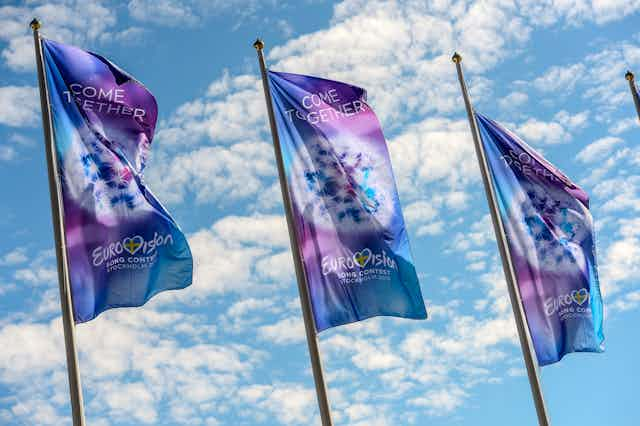The ticket agency for Eurovision 2016 caused alarm at the end of April when it published its first “flag policy”. It restricted regional flags, sounded ambivalent about EU and rainbow flags, and even compared eight very different territories to Islamic State – all to protect Eurovision’s “non-political nature”.
Organisers relaxed the flags policy a week later, but the question remains: can a contest where countries compete against each other ever be non-political?
Strictly speaking, broadcasters, not countries, compete in Eurovision. Its organiser is the European Broadcasting Union (EBU), an association of public service broadcasters founded in 1950 to relay radio and television signals across Europe.
But more people imagine what “Europe” might mean through watching Eurovision than might ever take part in EU public outreach. (How Australia features in this imagination is debatable.) And Eurovision certainly produces the impression of a competition between countries. Joe Woolford and Jake Shakeshaft are billed on screen as representing “the United Kingdom”, not “the BBC” – and Eurovision voting is famously divided up by country too.
Eurovision shorthand always mentions “countries” doing things, even though these are actions by specific organisations and people, not whole nations. This makes Eurovision a platform where states can promote narratives about national identity to more than 100m viewers – whether it’s showing off a national language, displaying a distinctive national music style, or tying in with national tourism campaigns.
But what if participants comment on politics?
A political ban
Although Eurovision rules ban “lyrics, speeches, gestures of a political or similar nature”, someone still has to determine what “political” means. At its strictest, there would be no songs about war or peace, history, the environment or nuclear disarmament – to say nothing of Eurovision 1990, after the fall of the Berlin Wall, where almost everything referenced freedom, eastern Europe, walls or peace. This obviously isn’t the case. But bans do occur.
In the 2000s the EBU twice objected to references to active political leaders. Ukraine’s host entry in 2005 had to remove lyrics naming the post-Orange Revolution president, and Georgia withdrew its 2009 entry (after the 2008 Russo-Georgian war) when organisers challenged the double meaning of “We Don’t Wanna Put In”.
Other cases were more ambiguous: was it accidental that Ukrainian Verka Serduchka’s “Dancing, Lasha Tumbai” sounded like “Russia, goodbye”? Was it non-political for a Portuguese group during the financial crisis to pastiche ideological music from Portugal’s revolutionary mid-1970s? Where does satire end and politics begin?
And at a time of European centenaries, there’s commemoration. All commemorations involve political choices. What gets remembered, and what if dominant interpretations of events clash between nations – or if commemorating the past also implies commentary on the present?
In 2015, Armenia’s centenary genocide recognition campaign, which extended to Eurovision, did not have to contend with Turkish state refusal to recognise the genocide (Turkey has not participated in Eurovision since 2012 over issues with the voting system). The song’s title did change from “Don’t Deny” – but the performance still communicated Armenian national resilience and continuity. (Meanwhile, the 2015 French entry used digital backdrops to depict the devastation of World War I.)
This year sees the first Ukrainian entry chosen since Russia annexed Crimea. The song, “1944”, commemorates Stalin’s deportation of Crimean Tatars to Central Asia during World War II. Beyond individual songs, the whole Eurovision project involves representing the meanings and boundaries of “Europe”. These are political ideas.
Come together?
Choosing the 2016 slogan “Come Together”, producers acknowledged the sensitivities of “throw[ing] Europe’s biggest party, while the togetherness you celebrate is being put to the test”. Thousands of refugees have died en route to Europe as border controls intensify.
Producers acknowledged the refugee crisis in the first semi-final through a dance performance honouring the struggles of refugees’ journeys. Refugees face the risks they do because of migration policies that have political origins, but clearly the producers considered this performance a social or humanitarian gesture rather than a “political” one.
Meanwhile, Eurovision’s history of LGBT fandom and visibility makes it a focus of international LGBT politics – with western European media as well as homophobic Russian politicians framing a moral struggle between “Europe” and “Russia” over LGBT rights. This was only amplified by Conchita Wurst winning in 2014 so soon after Russia hosted the Winter Olympics.
In these wider contexts, it becomes clear that Eurovision can hardly steer clear of politics. Eurovision is in a similar position to cult TV shows with vibrant fandoms (such as The 100, which dismayed fans by dramatically ending a relationship between two queer women). Producers plan what to depict; fans create their own celebrations within the space the show or Eurovision arena gives them. But producers depend on fans’ enthusiasm and creative practices (online or live) to drive interest in the show.
The “flag policy” controversy showed this tension at work. The first “flag policy” had stated “rainbow flags and the European Union flag will be tolerated” as long as they were not going to be used as a “tool to make a political statement”. An updated policy published that weekend removed this ambivalent language, but still seemed to exclude regional flags or the wider range of pride flags. Organisers implied that national flags or the rainbow flags still covered these identities, but many fans do not want these identities subsumed into a larger category.
Welsh and Sami fans had active media outlets following up the flag story, and were pleased to see the EBU later relax its policy. It also proposed “a more tolerant approach to other flags as long as the audience respects the non-political nature” of the show. But without any well-equipped organisation pushing the EBU on pride flags, Eurovision organisers haven’t as yet offered trans or bisexual flags recognition.
Eurovision’s priorities, “non-political” or not, are evidently those of countries and governments, not social movements outside the state. But fans, media and viewers often understand “politics” more widely. Eurovision’s organisers would be wise to embrace this.

